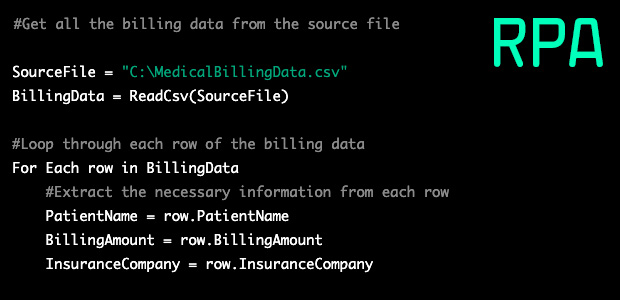In today’s fast-paced world, the healthcare industry faces numerous challenges when it comes to managing medical billing processes efficiently.

With the increasing complexity of healthcare systems and the constant changes in regulations, there is a growing need for automation to streamline and optimize medical billing operations. Robotic Process Automation (RPA) has emerged as a game-changing technology in the field of medical billing.
We highlight the importance of robotic process automation in medical billing and its potential benefits for healthcare organizations.
What is Robotic Process Automation (RPA) in Medical Billing?
Robotic Process Automation (RPA) in medical billing refers to the use of software robots or bots to automate and streamline various tasks involved in the billing process within the healthcare industry. RPA technology enables these bots to mimic human actions and interact with different systems and applications to perform repetitive and rule-based activities.
In the context of medical billing, RPA can handle tasks such as data entry, claims submission, eligibility verification, payment posting, and follow-up. By automating these processes, RPA significantly reduces the need for manual intervention, minimizing errors, improving accuracy, and enhancing overall efficiency. The bots can perform these tasks at a much faster pace than humans, leading to faster turnaround times, increased productivity, and improved revenue collection. RPA in medical billing also ensures compliance with regulatory requirements, such as HIPAA, by applying predefined rules consistently and maintaining data security and privacy.
Overall, RPA plays a crucial role in revolutionizing medical billing operations, optimizing resource utilization, and driving operational excellence in healthcare organizations.
The Evolution of Medical Billing
The Traditional Approach to Medical Billing
Medical billing has traditionally been a manual and time-consuming process. Healthcare organizations have relied on a workforce of billing professionals to handle tasks such as data entry, claims submission, payment posting, and follow-up. This manual approach is prone to errors, delays, and inefficiencies, leading to revenue leakage and increased administrative costs.
The Rise of Robotic Process Automation
Robotic Process Automation (RPA) has emerged as a powerful solution to revolutionize medical billing processes. RPA involves the use of software robots or bots that can mimic human actions and interact with various systems to perform repetitive tasks. By automating routine and rule-based activities, RPA reduces human intervention and enhances the accuracy, speed, and efficiency of medical billing operations.
Benefits of Robotic Process Automation in Medical Billing
Robotic Process Automation offers numerous benefits to healthcare organizations in the realm of medical billing. Let’s delve into some of the key advantages:
Enhanced Accuracy and Reduced Errors
One of the most significant benefits of RPA in medical billing is the enhanced accuracy it brings to the process. Unlike humans, bots are not susceptible to fatigue, distractions, or human errors. They follow predefined rules and execute tasks consistently, reducing the occurrence of errors and improving data accuracy. This helps in minimizing claim denials and rework, ultimately leading to increased revenue and improved patient satisfaction.
Increased Efficiency and Productivity
By automating repetitive and time-consuming tasks, RPA allows healthcare organizations to streamline their medical billing processes. Bots can handle activities such as data entry, eligibility verification, claims submission, and payment posting at a much faster pace compared to manual processing. This results in significant time savings and allows billing professionals to focus on more value-added activities, such as resolving complex billing issues and improving patient engagement.
Cost Savings and Revenue Optimization
Implementing RPA in medical billing can lead to substantial cost savings for healthcare organizations. By reducing the need for manual labor and eliminating errors, RPA helps in minimizing administrative costs and maximizing revenue collection. Additionally, the faster turnaround time for claims processing and reduced denial rates contribute to improved cash flow and financial performance.
Compliance and Regulatory Adherence
The healthcare industry is subject to stringent regulatory requirements, including HIPAA (Health Insurance Portability and Accountability Act) regulations. Non-compliance with these regulations can result in hefty penalties and reputational damage. RPA can play a vital role in ensuring compliance and regulatory adherence by automating processes and applying predefined rules consistently. This reduces the risk of human errors and helps healthcare organizations maintain data security and privacy.
Scalability and Flexibility
Medical billing volumes can vary significantly based on factors such as patient influx, changes in payer policies, and seasonality. RPA provides healthcare organizations with the scalability and flexibility to handle fluctuations in workload efficiently. Bots can be easily scaled up or down as per the demand, ensuring optimal resource utilization and avoiding the need for hiring and training additional staff during peak periods.
FAQs (Frequently Asked Questions)
Q: How does Robotic Process Automation work in medical billing?
A: Robotic Process Automation in medical billing involves the use of software robots or bots that mimic human actions to perform tasks such as data entry, claims submission, and payment posting. These bots interact with various systems and applications to automate repetitive and rule-based activities, enhancing the accuracy, speed, and efficiency of the medical billing process.
Q: Is Robotic Process Automation secure for medical billing?
A: Yes, Robotic Process Automation in medical billing can be made secure by implementing appropriate security measures. Organizations can ensure data security and privacy by applying access controls, encryption techniques, and audit trails. Additionally, bots can be configured to follow strict rules and guidelines to ensure compliance with HIPAA and other regulatory requirements.
Q: Can RPA replace human billing professionals in medical billing?
A: While RPA can automate a significant portion of medical billing tasks, it does not aim to replace human billing professionals entirely. Instead, it complements their skills and expertise by taking over repetitive and rule-based activities. This allows billing professionals to focus on more complex tasks, such as resolving billing issues, improving patient experience, and optimizing revenue.
Q: How long does it take to implement Robotic Process Automation in medical billing?
A: The implementation timeline for Robotic Process Automation in medical billing can vary depending on factors such as the complexity of existing processes, the number of systems involved, and the level of customization required. Generally, it takes a few weeks to a few months to implement RPA successfully. It involves activities such as process assessment, bot development, testing, and deployment.
Q: What are the potential risks of implementing RPA in medical billing?
A: While the benefits of RPA in medical billing are significant, there are some potential risks to consider. These include the need for proper governance and oversight to ensure bots are performing as intended, the possibility of system incompatibility, and the requirement for ongoing maintenance and support. Organizations should have a well-defined strategy and robust governance framework in place to address these risks effectively.
Q: Can small healthcare organizations benefit from Robotic Process Automation in medical billing?
A: Yes, even small healthcare organizations can benefit from Robotic Process Automation in medical billing. RPA offers scalability and flexibility, allowing organizations of all sizes to automate and streamline their billing processes. By reducing manual effort, enhancing accuracy, and optimizing revenue collection, RPA helps small healthcare organizations improve efficiency, reduce costs, and enhance overall operational performance.
Summary
In conclusion, the importance of Robotic Process Automation in medical billing cannot be overstated. By leveraging this transformative technology, healthcare organizations can achieve enhanced accuracy, increased efficiency, cost savings, and improved compliance in their medical billing processes. With the ability to handle large volumes of data, ensure regulatory adherence, and scale operations as needed, RPA is a powerful tool that can revolutionize medical billing and drive operational excellence in the healthcare industry.

